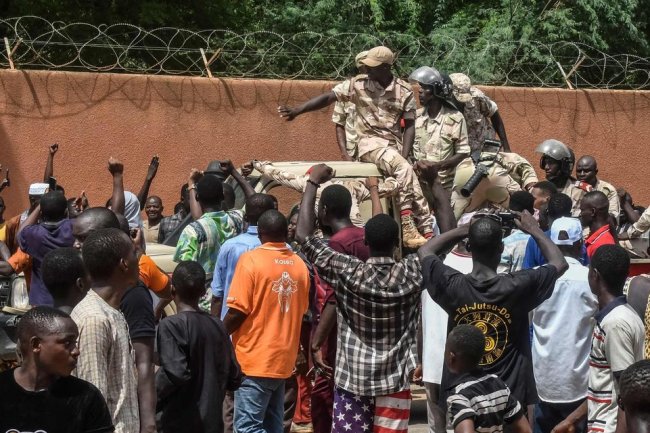Daniel Ortega Turns Against the Jesuits
Pope Francis’ religious order is paying the price for its blind belief in the dictator’s utopian promises about socialism. By Mary Anastasia O’Grady Sept. 3, 2023 1:57 pm ET Daniel Ortega in Managua, Nicaragua, July 19. Photo: cesar perez/Agence France-Presse/Getty Images Few religious institutions were of greater service to Nicaraguan dictator Daniel Ortega during his rise to power than the Catholic religious order known as the Society of Jesus. But the Jesuits have outlived their usefulness to the 77-year-old tyrant. Last month he froze their bank accounts, dissolved their legal status in the country, seized their property, and took over the Jesuit Central American University in Managua, founded in 1960. So goes the revolution, gobbling up its own—a


Daniel Ortega in Managua, Nicaragua, July 19.
Photo: cesar perez/Agence France-Presse/Getty Images
Few religious institutions were of greater service to Nicaraguan dictator Daniel Ortega during his rise to power than the Catholic religious order known as the Society of Jesus. But the Jesuits have outlived their usefulness to the 77-year-old tyrant. Last month he froze their bank accounts, dissolved their legal status in the country, seized their property, and took over the Jesuit Central American University in Managua, founded in 1960. So goes the revolution, gobbling up its own—again.
In the 1970s, Mr. Ortega and his communist Sandinista army led a guerrilla war, backed by the Soviet Union and Cuba, against dictator Anastasio Somoza. In those days the Jesuits and other Catholic priests in Central America were known as advocates of liberation theology—which shared certain Marxist concepts. Some of these men of the cloth—and some nuns—became political and used the Gospel in their work around the country to support the “social justice” agenda of the Sandinistas. When Somoza was toppled in 1979, Mr. Ortega installed his own military dictatorship. He made a Catholic priest minister of culture; a Maryknoll priest became foreign minister, and a Jesuit would later serve as education minister.
Nicaragua suffered a decade of Sandinista repression, which included much brutality against the indigenous population and highland peasants. Nicaraguans, led by the Contras, fought back. The hierarchy of the Nicaraguan Catholic Church played a key role in the resistance. By 1990 Mr. Ortega was forced to hold an election with international observers. He lost to his rival, Violeta Chamorro, and reluctantly stepped aside. But he refused to relinquish Sandinista control of the army or the courts. Before they left power, the comandantes stole millions of dollars of property and stripped government offices bare.
Mr. Ortega lost two more presidential elections, in 1996 and 2001. In the mid-2000s he engaged in an image makeover, which included a very public embrace of Catholicism and a 2005 Catholic marriage ceremony to his longtime partner, Rosario Murillo. In 2006 he finally won a presidential election thanks to a dirty deal with some members of the opposition in congress to lower the threshold for a first-round election victory to 35% in exchange for keeping corrupt leadership of the center-right out of jail.
During the next decade Nicaragua received large subsidies from oil-rich Venezuela, which the clever despot and his wife used both to enrich themselves and to consolidate power. Brick by brick he destroyed the institutional independence necessary to defend against dictatorship. But much of the business and political elite went along with him because he was also fattening their bank accounts. Mr. Ortega gained a reputation among investors as a reformed communist who had morphed into a capitalist. In fact, by exercising his authoritarian power he had become the owner of the Nicaraguan economy. When oil prices tanked and the economic squeeze hit pocketbooks, Mr. Ortega’s popularity hit the skids. He responded with a crackdown on dissent.
When students opposed to Mr. Ortega’s one-man rule led protests in April 2018, state security forces and paramilitary crushed them. Six months later more than 320 demonstrators, mostly students, had been killed. The aim was to instill fear, but it wasn’t enough. Brave opposition leaders and presidential candidates campaigned ahead of the November 2021 election. Mr. Ortega carted them off to prison and “won” the election.
Those dissidents were still languishing behind bars or under house arrest in February when the dictator crafted a deal with the Biden administration to give them humanitarian parole for two years. In all, 222 political prisoners were deported to Washington, to begin lives in exile.
Freedom of thought and expression also had to go. In September 2022, the online news outlet Confidencial reported that Mr. Ortega had “closed 54 national and local media in 13 departments, there are 11 media workers in jail, and more than 140 journalists in exile.” Mr. Ortega has closed or seized at least 26 private universities, according to an Aug. 17 report from CBS News in Miami.
The Nicaraguan Catholic Church is again in open rebellion against the regime. Bishop Rolando Álvarez,
an outspoken critic of the police state, was one of the political prisoners that Mr. Ortega tried to send to the U.S. But the prelate refused to be banished. He’s serving a 26-year prison sentence. As the Soviets learned in Poland, the faith is a powerful weapon against tyranny.The second coming of Somoza wasn’t what the Jesuits had in mind when they backed sandinismo, and by last month Central American University had become a hotbed of the pro-democracy struggle. But the signs were there during his first dictatorship, and Mr. Ortega’s true believers looked the other way. The crocodile is eating them last, to paraphrase Winston Churchill’s definition of an appeaser.
Pope Francis, who is a Jesuit, hasn’t said a thing in defense of his brothers in Nicaragua. It may be painful to admit that naiveté about the utopian promises of socialism and resentment toward the bourgeoise led the Jesuits down a dangerous path in Latin America. Unchecked power, as usual, turned the state into a predator. The road back to Nicaraguan freedom won’t be easy.
Write to O’[email protected].
What's Your Reaction?

















